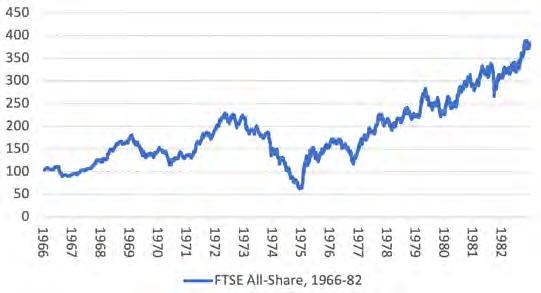
1 minute read
Russ Mould: Insightful commentary on market issues
FTSE 100’s fortunes lie with oils, miners and banks in particular
Those facets were a handicap in the 2010s, but they have become more of an asset in the 2020s. The bulk of the FTSE 100’s earnings and dividends come from cyclical, ‘value’ sectors and that may be no bad thing at a time of rising inflation, higher nominal growth and rising interest rates. A higher cost of capital may also place a premium on the sort of cash flow and financial solidity that wellestablished megacaps can provide and early-stage growth stocks cannot.
Controversy
Yet there are still risks. A long and deep recession could puncture oil and metal prices, increase banks’ bad loan provisions and drag interest rates lower once more. A fierce and sustained inflationary outbreak might not be helpful either.
The FTSE All-Share suffered terribly in the early 1970s after the Barber crack-up boom and an oil price shock saw inflation reach double digits. The forward price to earnings ratio of the FTSE All-Share bottomed in the low single digits and anyone who put money into UK equities in 1966 had to dutifully wait until 1982 to get their money back in real, inflation-adjusted terms.
Yet even then, UK stocks offered better protection against inflation than either cash or bonds and the FTSE All-Share rallied furiously from its 1974 nadir.
Again, bulls will argue this is where the opportunity may now lie, if indeed a 40-year era of cheap money, cheap energy, cheap labour and cheap goods is coming to an end, as the FTSE 100’s exposure to real assets, in the form of commodities, real estate and property, could offer some hedge against the ravages of inflation relative to paper ones like cash or bonds.
Sign Of The Times
The FTSE 100 is not as cheap as the FTSE All-Share was in 1974 but it trades at hefty discounts to its American and European peers on around 11 times forward earnings and a 4% dividend yield for 2023, according to consensus analyst forecasts.

Add a currency which is yet to recapture the ground lost in the wake of the Brexit vote to a period of sustained underperformance and UK equities could be cheap, as around a dozen takeover bids from trade or financial buyers for FTSE 100 members since 2016 may also attest.
Granted, those forecasts could be optimistic and the weighting toward oils, miners and banks lends the index a distinct air of unpredictability. But the lowly multiples attributed to those forecasts, and the meaty yield that investors are demanding in compensation for the perceived dangers, suggests faith in them is not high and that at least a degree of bad news is already factored into share prices and index levels.










